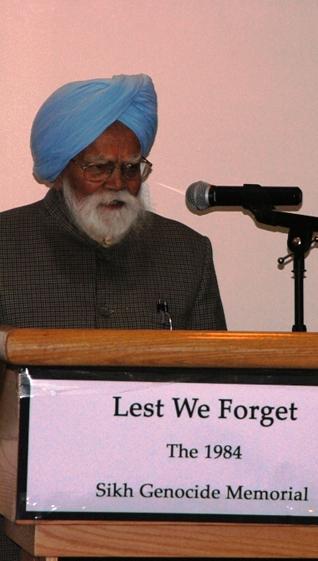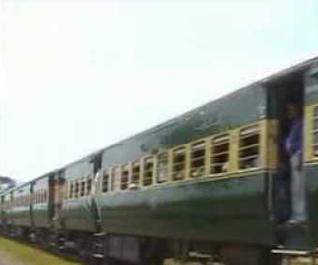1984
1984: A Train From Pakistan
by MANGAL SINGH
Editor: The following is an edited translation of an extract from a talk gven by the author at Atlanta, Georgia, U.S.A. last Fall, to mark the 25th anniversary of India's 1984 crimes and human rights violation.
We have gathered here today to remember the atrocities of the Indian Government against the Sikh community as a whole in 1984, in India. Sikhs were victims of two sets of outrages that year: The attack of the Indian Army on the sacred Golden Temple, Amritsar, and simulateneously on 36 other historic shrines in Punjab - an 'operation' given the name of 'Blue Star' by the Indian army. The second took place over the three opening days of November, 1984, after the death of Indian Prime Minister, Indira Gandhi.
The Sikh Religion came into being after the birth of Guru Nanak in 1469. The Sikh community, during its life of almost five-and-a-half centurues, has gone through so many strings of atrocities and holocausts that it is unbelievable. Guru Arjan, the Fifth Guru, was tortured to death in the year 1606 at Lahore. Guru Tegh Bahadar, the Ninth Master, and his three followers, were tortured to death at Delhi in the public square. Guru Gobind Singh had to sacrifice his whole family, mother, father, four sons, and himself to fight the tyrannical regimes. There is a never-ending list of Sikh martyrs starting from Baba Deep Singh, Baba Gurbax Singh ji, Baba Bota Singh ji, Baba Garja Singh ji, Baba Naudh Singh ji, Baba Banda Singh Bahadar ... but all these happened when India was under tyrannical Muslim rule or the oppression by the Hindu Hill Rajas, at a time when the land was in the control of foreigners.
Now, I come to my personal life experiences in June 1984 - in what we generally describe as an Independent India. My wife, Paramjit Kaur, and I joined a tour of Historical Gurdwaras in Pakistan. A jatha of 1325 pilgrims from India left Amritsar by train on May 25, 1984. We stayed at Panja Sahib Gurdwara for four days; another four at Nankana Sahib, the birth-place of Guru Nanak, and finally we were in Lahore for four days.
We were to be back home in Punjab on June 4, 1984 ... but it turned out to be the day the Indian Army was to launch an attack the Golden Temple and other Sikh shrines in Punjab and elsewhere in the country.
Our passports were stamped for the return journey. We boarded the train in Lahore, but it stayed in the railway station. Some of our Sikh youth approached the rail and security people for information, as it was very hot and we were all sweating in the train. The reply was that the Indian Government was not ready to take us back today and was negotiating with the Pakistan Government at Islamabad to keep us out of India for at least four more days.
At this, our youth flared up and protested: "We have no money, we have spent all. We want to head home to our families and dear ones in India".
At this, the Pakistan Security advised us that they were on a foreign land. No protesting or any other such behavior would be allowed by them. They informed us that 'your own democratic Government to whom you all belong has refused to take you back.'
By then, the Pakistan Government agreed to shelter us for two more days. We went back to our barracks. The Pakistan authorities showed on TV through satellite how the Indian troops had stormed the Golden Temple in Amritsar, India - including its surroundings, the parikarma, with blood and dead bodies everywhere. The Pakistan Government made a public announcement in Lahore that the local business people must accept Indian currency from us, and the Pakistan Govt. would exchange later later for them. They were further generous enough to offer that those of us who did spend have enough cash, they would lend us some money for food ands necessities.
On June 6, we finally left for India. After custom clearance at the Wagha Border, all compartments of the train were dead-locked. The train stopping chains in all the compartments were disconnected. All the windows were shut.The train steamed off, but did not stop at Amritsar, Jalandhar or Ludhiana, and finally stopped once we had left Punjab, at Ambala Cant in the state of Haryana.
During our passage through Punjab, there were no visible signs of life on the outside. We were burning with heat, and hungry without food, in the fast-running train. All the buses and trucks from Delhi, were parked on the G.T. road with their passengers in them (for six days, we found out later). There was a long line-up of them all the way to Karnal, about 30 miles long.
Local Sikh farmers from the neighbouring countryside had cooked food and transported it from their villages to feed the troubled public for a week. There was no arrangement from the government at all.. A member of the gurdwara parbandhak committee from the Sirhind area was in my compartment when we was passing Sirhind. He came to me and said that it was possible that in Haryana, the Bhajan Lal government might try to coerce us into coverting to Hinduism by forcibly shaving us. I told him that we are 1325 and we should fight to the last, if such a situation arises.
The train stopped at the Ambala Cantonment railway station. There was a railway employee standing outside each compartment to unlock the train. A loud-speaker voice said: "The pilgrims from Pakistan have reached Ambala Cantonment. There are some arrangements for hot water for washing hands and faces. There is a first-aid post to treat minor ailments. Food is available. After eating food, the pilgrims from Haryana and Delhi are to board the same train. Pilgrims from Chandigarh will be provided special buses. Those from Punjab will stay at Farukha Khalsa High School till further orders, because Punjab is under curfew."
The pilgrims from Delhi were sent to Delhi by the same train. For Chandigarh, the buses were sent on the same day. We were transported to the Farukha High School to wait till clearance was received from Punjab. Local Sikhs who came to greet us were weeping over the Government's declaration over the death of Jarnail Singh Bhindrawala and the local Hindu community was reported distributing ladoos (sweets). The local Sikhs helped us with food supplies, large cooking utensils, and helped us in all matters including taking phone numbers of our dear and loved ones to inform them. But as no phones were working in Punjab, they couldn't help us on this. We were appreox. 700 in number.
On the third day, the Deputy Commissioner came to see us. We requested him to send us back home under army protection. He promised to talk with army personnel. On the fourth day, buses were sent to all the districts in Punjab under army escort and the Deputy Commissioners of the respective districts arranged for all pilgrims to be dropped off at their homes in curfew-ridden Punjab.
This is how we reached home after an extra seven days in limbo. There was curfew when we came home to Sultanpur Lodhi.
[Translated and edited from the original lecture, which was delivered in Punjabi.]
June 14, 2010
Conversation about this article
1: I.J. Singh (New York, U.S.A.), June 14, 2010, 12:17 PM.
And this is how a democratic country treats its own innocent citizens? As T.S. Eliot, speaking of history, said: "After such knowledge what forgiveness..."
2: Gurmeet Kaur (Atlanta, Georgia, U.S.A.), June 14, 2010, 2:08 PM.
A chilling recollection of Sardar Mangal Singh's journey from Pakistan. "Your own Government to whom you all belong has refused to take you back." Thus begins his story! First-hand narratives such as these are important to document and preserve, so some day, someone can paint the complete picture of 1984 on a huge canvas for the world to see. By the way, Daarji (as he is lovingly called) is bilingual and delivered this talk in English as we had many non-Punjabi/Sikh guests at the 1984 Atlanta Memorial.
3: Harminder Kaur (New York, U.S.A.), June 14, 2010, 3:11 PM.
Never forget 1984. May the Khalsa Panth ever be in Chardi Kalaa!
4: Taran (London, United Kingdom), June 14, 2010, 4:40 PM.
The fact is that we are still second class citizens in India. We need to change this, if others won't.
5: Gurjender Singh (Maryland, U.S.A.), June 14, 2010, 7:43 PM.
When my grandmother (then living with one of her elder sons) died on June 4, 1984 in District Ludhiana, Punjab, the Indian police refused to allow any of her other sons, daughters and family members from other parts of Punjab and Chandigarh to pay final respect to their mother.
6: Mninder Kaur (Atlanta, Georgia, U.S.A), June 16, 2010, 6:04 PM.
Facts are always hard to face and this is another fact that being a Sikh, we have no country of our own - our Motherland. Life is a journey and all the Sikhs are on a journey to make a homeland.
7: Jaskaran Deep Singh (Amritsar, Punjab), March 27, 2013, 4:51 AM.
I was also in this train with my mom, dad and sister.




